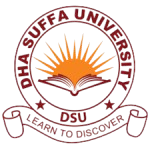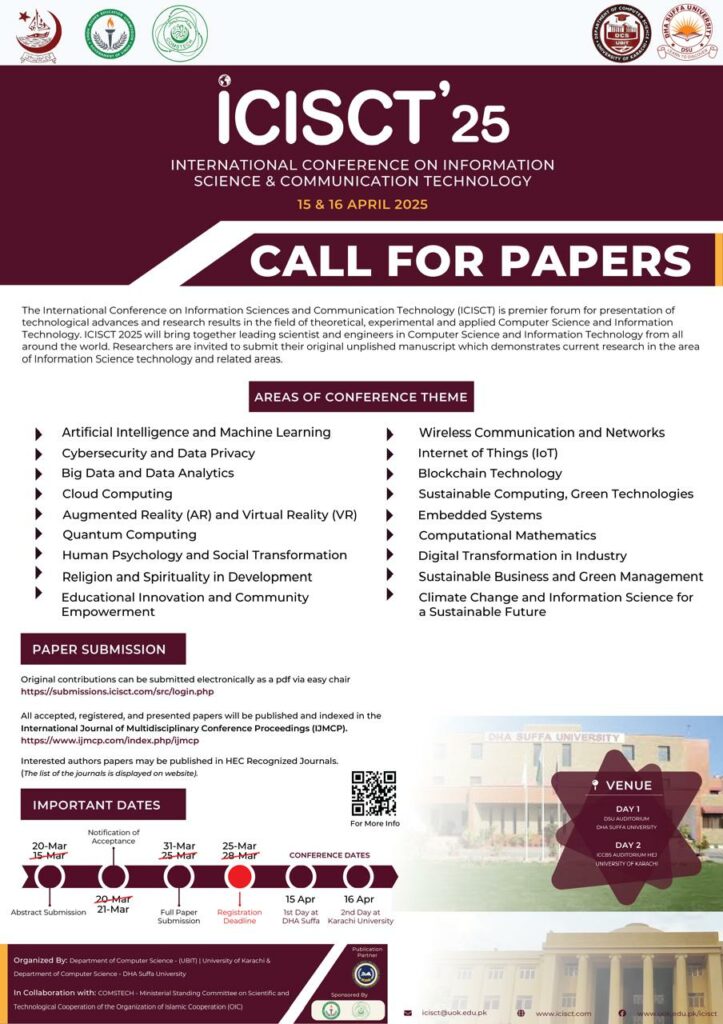Bachelors of Science in Computer Engineering
Bachelors of Science in Computer Engineering
ELIGIBILITY CRITERIA
- Intermediate or an equivalent examination (Pre-Engineering/ Pre-Medical/ General Science) with at least 60% marks; Or
- A-Level with minimum 3 passes in principal subjects
- At least 50% marks in DSU Entrance Test
REQUIRED DOCUMENTS
- Matriculation / O-Level / Equivalent Marks Sheet / Statements and Certificates
- Intermediate / Equivalent / A-Level Marks Sheet / Statements and Certificates
- Applicants with O-Level / A-Level and Technical studies must submit equivalence from IBCC
- College Provisional Certificate / Promotion Certificate by the respective Board
- A copy of CNIC and B-Form
- 3 passport-sized photographs with white background
- Admit Card / Statement of Entry is required, if awaiting result
OPTIONAL:
Valid test scores of NEDUET (current year), NTS NAT (IE/ICS) (current year) or SAT II (within two years) if appeared. Applicants Submitting NEDUET, NTS NAT (IE/ICS) or SAT II test scores shall be exempted from taking DSU’s entrance test. However, candidates who do not have good enough NEDUET, NTS NAT (IE/ICS) or SAT II scores will be advised to appear in the DSU Admissions Test for better chances of securing admission.
BS Computer Engineering emphasizes the design and development of computer hardware, embedded systems, as well as software. Its curriculum includes courses such as digital logic design, microprocessors, circuits, electronics, computer architecture, and hardware-software integration, along with programming and operating systems. In contrast, Computer Science concentrates on software systems, algorithms, data structures, databases, and theoretical foundations.
Computer Engineering graduates are more likely to work in embedded systems, hardware design, robotics, and systems integration, while Computer Science graduates often pursue careers in software development, data science, and research.
Computer Engineering graduates are more likely to work in embedded systems, hardware design, robotics, and systems integration, while Computer Science graduates often pursue careers in software development, data science, and research.
Plan of Study
BS Computer Engineering
| Semester 1 | |||
| S. No. | Course Title | Credit Hours | Pre-Requisite |
|---|---|---|---|
| 1 | Applied Physics | 2 | - |
| 2 | Applied Physics Lab | 1 | - |
| 3 | Calculus and Analytical Geometry | 3 | - |
| 4 | Application of Information & Communication Technologies | 2 | - |
| 5 | Application of Information & Communication Technologies Lab | 1 | - |
| 6 | Programming Fundamentals | 3 | - |
| 7 | Programming Fundamentals Lab | 1 | - |
| 8 | Functional English | 3 | - |
| Total Cr Hrs | 16 | ||
| Semester 2 | |||
| S. No. | Course Title | Credit Hours | Pre-Requisite |
| 1 | Linear Algebra | 3 | Calculus |
| 2 | Linear Circuit Analysis | 3 | - |
| 3 | Object Oriented Programming | 3 | PF |
| 4 | Object Oriented Programming Lab | 1 | PF |
| 5 | Discrete Structures | 3 | - |
| 6 | Islamic Studies | 2 | - |
| 7 | Digital Logic Design | 2 | - |
| 8 | Digital Logic Design Lab | 1 | - |
| Total Cr Hrs | 18 | ||
| Semester 3 | |||
| S. No. | Course Title | Credit Hours | Pre-Requisite |
| 1 | Multivariable Calculus | 3 | Calculus |
| 2 | Data Structures & Algorithms | 3 | OOP |
| 3 | Data Structures & Algorithms Lab | 1 | OOP |
| 4 | Expository Writing | 3 | Functional English |
| 5 | Electrical Network Analysis | 2 | - |
| 6 | Electrical Network Analysis Lab | 1 | - |
| 7 | Information Security | 2 | - |
| 8 | Information Security Lab | 1 | - |
| 9 | Pakistan Studies | 2 | - |
| Total Cr Hrs | 18 | ||
| Semester 4 | |||
| S. No. | Course Title | Credit Hours | Pre-Requisite |
| 1 | Probability and Statistics | 3 | - |
| 2 | Computer Organization and Assembly Language | 2 | DLD |
| 3 | Computer Organization and Assembly Language Lab | 1 | DLD |
| 4 | Signals and Systems | 2 | - |
| 5 | Signals and Systems Lab | 1 | - |
| 6 | Electronic Devices and Circuits | 2 | - |
| 7 | Electronic Devices and Circuits Lab | 1 | - |
| 8 | Database Systems | 3 | - |
| 9 | Database Systems Lab | 1 | - |
| Total Cr Hrs | 16 | ||
| Semester 5 | |||
| S. No. | Course Title | Credit Hours | Pre-Requisite |
| 1 | Artificial Intelligence | 2 | - |
| 2 | Artificial Intelligence Lab | 1 | - |
| 3 | Computer Architecture | 2 | - |
| 4 | Computer Architecture Lab | 1 | - |
| 5 | Domain Elective 1 | 3 | - |
| 6 | Software Engineering | 3 | - |
| 7 | Civics and Community Engagement | 2 | - |
| 8 | Operating Systems | 2 | - |
| 9 | Operating Systems Lab | 1 | - |
| 10 | Understanding of Holy Quran / Fehm-e-Quran I (For Muslims Only) | 1 | - |
| Total Cr Hrs | 18 | Semester 6 | |
| S. No. | Course Title | Credit Hours | Pre-Requisite |
| 1 | Domain Elective 2 | 2 | - |
| 2 | Domain Elective 2 Lab | 1 | - |
| 3 | Understanding of Holy Quran / Fehm-e-Quran II (For Muslims Only) | 1 | F.Q-1 |
| 4 | Analysis of Algorithms | 3 | Data Structures |
| 5 | Parallel and Distributed Computing | 2 | - |
| 6 | Parallel and Distributed Computing Lab | 1 | - |
| 7 | Domain Elective 3 | 2 | - |
| 8 | Domain Elective 3 Lab | 1 | - |
| 9 | Computer Networks | 2 | - |
| 10 | Computer Networks Lab | 1 | - |
| Total Cr Hrs | 16 | ||
| Semester 7 | |||
| S. No. | Course Title | Credit Hours | Pre-Requisite |
| 1 | Final Year Design Project 1 | 2 | - |
| 2 | Technical and Business Writing | 3 | Functional English |
| 3 | Domain Elective 4 | 2 | - |
| 4 | Domain Elective 4 Lab | 1 | - |
| 5 | Domain Elective 5 | 2 | - |
| 6 | Domain Elective 5 Lab | 1 | - |
| 7 | Domain Elective 6 | 2 | - |
| 8 | Domain Elective 6 Lab | 1 | - |
| 9 | Elective Supporting Course | 3 | - |
| Total Cr Hrs | 17 | ||
| Semester 8 | |||
| S. No. | Course Title | Credit Hours | Pre-Requisite |
| 1 | Final Year Design Project 2 | 4 | FYP 1 |
| 2 | Social Sciences (General Education Elective) | 2 | - |
| 3 | Professional Ethics/Practices | 2 | - |
| 4 | Domain Elective 7 | 2 | - |
| 5 | Domain Elective 7 Lab | 1 | - |
| 6 | Entrepreneurship | 2 | - |
| 7 | Ideology and Constitution of Pakistan | 2 | - |
| Total Cr Hrs | 15 | ||
Total Credit Hours = 134
Pool of Elective Courses
(All Course outlines shall be as per HEC Guidelines)
1) Pool of Social Sciences and General Education Electives
- International Relations
- Critical Thinking
- Organizational Behavior
- Leadership and Personal Grooming
- Project Management
- Digital Marketing
- Supply Chain Management
- Engineering Management
- Marketing Management
- Engineering Economics
2) Pool of Domain Electives
- Digital Signal Processing
- Parallel Computer Architectures
- Digital System Design
- Machine Learning
- Artificial Neural Networks & Deep Learning
- Digital Image Processing
- Computer Interfacing
- Theory of Automata
- HCI & Computer Graphics
- Internet of Things
- Pattern Recognition
- Computer Vision
- Cloud Computing
- Control Engineering
- Chip and IC Design
- Cyber Security
- Vehicular Networking
- Embedded Systems
- Mobile Computing
- Application Development
- Big Data Analytics
- High Performance Computing using CUDA
- Game Design and Development
FEE STRUCTURE
| PROGRAM | ONE TIME CHARGES (ONLY IN 1ST SEMESTER FEES) | PER SEMESTER | |||||
|---|---|---|---|---|---|---|---|
| ADMISSION FEE | CAUTION MONEY (REFUNDABLE) | IT CHARGES | MISC. CHARGES | Examination Charges (Per Course) | LAB CHARGES (PER CREDIT HOUR) |
TUITION FEE (PER CREDIT HOUR) |
|
| BS (Computer Engineering) | 15,000 | 10,000 | 5,500 | 6,850 | 1,000 | 10,000 | 5,770 |
| PROGRAMS | 1ST SEMESTER FEE AMOUNT | SEMESTER FEE (WITHOUT ADM & C/ MONEY) | CREDIT HOURS 1ST SEMESTER |
|---|---|---|---|
| BS (Computer Engineering) | 143,130 | 118,130 | 14 + 2 |


